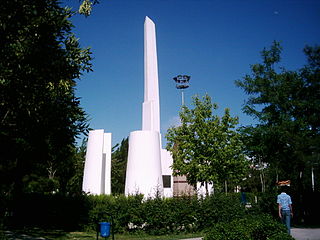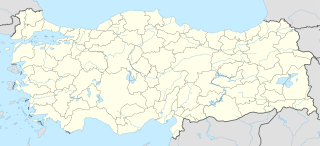Related Research Articles

Bingöl Province is a province of Turkey in Eastern Anatolia. The province was known as Çapakçur Province until 1945 when it was renamed as Bingöl province. Its neighboring provinces are Tunceli, Erzurum, Muş, Diyarbakır, Erzincan and Elazığ. The province covers an area of 8,125 km2 and has a population of 255,170. The capital is Bingöl. As the current Governor of the province, Kadir Ekinci was appointed by the president on the 5 November 2018.

The Zazas are a people in eastern Turkey who speak the Zaza language. Their heartland consists of Tunceli and Bingöl provinces and parts of Elazığ, Erzincan and Diyarbakır provinces. Zazas generally consider themselves Kurds, and are often described as Zaza Kurds.

Xoybûn or Khoyboun was a nationalist organisation of Kurds that is known for leading the Ararat rebellion, commanded by Ihsan Nuri. Many Armenians joined the movement as well.

Sheikh Said of Palu was a Zaza sheikh, the main leader of the Sheikh Said rebellion and a Sheikh of the Naqshbandi order.

Kurds in Turkey refers to people born in or residing in Turkey who are of Kurdish origin. The Kurds are the largest ethnic minority in Turkey. According to various estimates, they compose between 15% and 20% of the population of Turkey. There are Kurds living in various provinces of Turkey, but they are primarily concentrated in the east and southeast of the country, within the region viewed by Kurds as Turkish Kurdistan. Officially in Eastern Anatolia and Southeastern Anatolia Regions.

Lice, is a Kurdish-populated town in Diyarbakır Province in Turkey. The population was 9,644 in 2010. It is located 90 km (56 mi) from the capital, Diyarbakır. In the local elections in March 2019 Tarık Mercan from the Peoples' Democratic Party (HDP) was elected mayor. As the current District Governor was appointed Cevdet Bakkal.
The Koçgiri rebellion or Koçkiri rebellion was a Kurdish uprising, that began in the overwhelmingly militant Koçgiri region in eastern present-day Sivas Province in February 1921. The rebellion was initially Alevi, but succeeded in gathering support from nearby Sunni tribes. The tribe leaders had close relations to the Society for the Rise of Kurdistan (SAK). The rebellion was defeated in June 1921.

The Sheikh Said Rebellion or Genç Incident was a Kurdish rebellion aimed at reviving the Islamic caliphate and sultanate. It used elements of Kurdish nationalism to recruit. It was led by Sheikh Said and a group of former Ottoman soldiers also known as the Hamidiye regiments. The rebellion was carried out by two Kurdish sub-groups, the Zaza and the Kurmanji.
Kurdish rebellions in Turkey refer to Kurdish nationalist uprisings in Turkey, beginning with the Turkish War of Independence and the consequent transition from the Ottoman Empire into the modern Turkish state and lasting until present with the ongoing Kurdish-Turkish conflict.

The Dersim rebellion was an Alevi Kurdish uprising against the Turkish government in the Dersim region of eastern Turkey, which includes parts of Tunceli Province, Elazığ Province, and Bingöl Province. The rebellion was led by Seyid Riza, a chieftain of the Abasan tribe. As a result of the Turkish Armed Forces campaign in 1937 and 1938 against the rebellion and its massacres of civilians, thousands of Alevi Zazas died and many others were internally displaced.

The Ararat rebellion, also known as the Ağrı rebellion, was a 1930 uprising of the Kurds of Ağrı Province, in eastern Turkey, against the Turkish government.
Society for the Rise of Kurdistan also known as the Society for the Advancement of Kurdistan (SAK), was secretly established in Constantinople on 6th November 1917 and officially announced organization formed on the 17 December 1918. It was headquartered in Istanbul, with the aim of creating an independent Kurdish state in eastern Turkey. The Society based its statements for an independent or autonomous Kurdistan on the Treaty of Sèvres and the Fourteen Points stipulated by Woodrow Wilson. The society formed many local dependencies in the eastern provinces of Turkey.

Sheikh Ubeydullah also known as Sayyid Ubeydullah, was the leader of the first modern Kurdish nationalist struggle. Ubeydullah demanded recognition from Ottoman Empire and Qajar dynasty authorities for an independent Kurdish state, or Kurdistan, which he would govern without interference from Ottoman or Qajar authorities. He was a Sayyid, a descendant of Prophet Muhammad. He claimed descent from Shaykh Abdul Qadir Gilani.

The nationalist movement among the Kurdish people first emerged in the late 19th century with an uprising in 1880 led by Sheik Ubeydullah. Many Kurds worked with other opponents of the Ottoman regime within the Committee of Union and Progress (CUP). A growth in ethnic consciousness at the start of the 20th century was spearheaded by the Society for the Elevation of Kurdistan. Some Kurdish nationalist groups agitated for secession, others for autonomy.
The Beytussebab rebellion was the first Kurdish rebellion in the modern Republic of Turkey. The revolt was led by Halid Beg Cibran of the Cibran tribe. Other prominent commanders where Ihsan Nuri and Yusuf Ziya Bey. Its causes laid in opposition to the abolition of the Ottoman Caliphate in 1923, the repressive Turkish policies towards Kurdish identity, the prohibition of public use and teaching of the Kurdish languages, and the resettling of Kurdish landowners and tribal chiefs in the west of the country. Numerous officers of the Turkish army deserted for the rebellion. The rebellion began in August 1924, when the garrison of Beytüşşebap revolted against the Turkish government. The rebellion proved unsuccessful, and ended shortly after it began. Yusuf Ziya Bey was arrested on the 10 October 1924 and reportedly accused Halid Beg Cibran of having been also involved in the revolt. Halid Beg Cibran was captured in Erzurum in December 1924. Both were courtmartialed in Bitlis. Although the rebellion was suppressed, another Kurdish uprising, the Sheikh Said rebellion, would begin the next year.

During World War I, several Kurdish rebellions took place within the Ottoman Empire. These revolts were encouraged by the western allies, particularly Britain, who promised the Kurds an independent state. The first Kurdish rebellion was launched in August 1914, before the Ottoman entry into World War I. From 1915 to 1916, further Kurdish rebellions took place in Botan, Dersim, and south of Kiğı. In summer 1917, rebellions took place in Botan, Dersim, and Kharput. The last rebellions took place in August 1917, which were also the only ones to receive allied military support, albeit limited.

Abdul-Kadir Ubeydullah President of Kurd Society for Cooperation and Progress and later Society for the Elevation of Kurdistan, was a leading Kurd nationalist intellectual.

Miralay Halid Beg Cibran was a Kurdish soldier in the Ottoman and Turkish army and chairman of the Azadî organization.
The Azadî, officially Civata Azadiya Kurd, later Civata Xweseriya Kurd was a Kurdish secret organization. According to Kurds who reported to British intelligence officers, Azadî was established in Erzurum in 1921 by Halid Beg Cibran. The aim of Azadî was to deliver the Kurds a life in freedom in a developed environment.
The Uprising of Sheikh Ubeydullah refers to a Kurdish revolt against the Ottoman Empire in 1879 and the Persians between 1880–1881. Both revolts were led by Sheikh Ubeydullah, the leader the Semdinan Naqshbandi family who claimed descendance from Mohammed through his daughter Fatima. Thus the family had a considerable influence, disposed over large amounts of donations, owned several villages in the region and many Kurdish tribal leaders were devout followers of him. The initial cause for the uprisings were the outcome of the Russo-Turkish war in 1877-78 and the Treaty of Berlin which provided the Christian Armenians and the Nestorians with considerable rights and autonomy, to which he did not agree to.